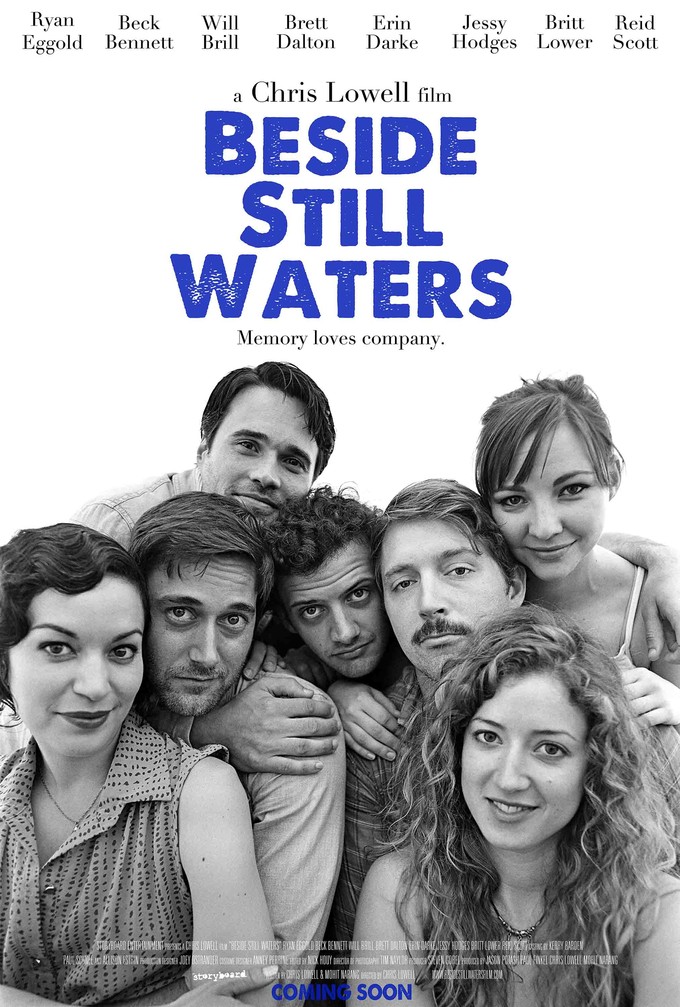
You probably know Chris Lowell from his work as an actor. Whether as Piz on VERONICA MARS, as Dell on the first three seasons of PRIVATE PRACTICE, as Emma Stone's boyfriend in THE HELP, and as one of the three central brothers on Fox's ENLISTED, Lowell has been acting in high-profile projects for the last decade. Now, he's turned his focusing to writing and directing, premiering his first film, BESIDE STILL WATERS at the Mill Valley Film Festival last year. The film is finally being released, and Lowell's directorial debut has the added advantage of featuring a number of actors who've moved on to successful TV gigs in the time since shooting wrapped. The lead, Ryan Eggold, is currently starring as Elizabeth Keen's husband, Tom, on THE BLACKLIST, Brett Dalton has gone good and bad and good again on AGENTS OF S.H.I.E.L.D., Timothy Reid has been charming his way into the Oval Office on VEEP, and Beck Bennet has been cutting an impression on SNL with his Baby-Man character and his shorts with Kyle Mooney.
BESIDE STILL WATERS is a film about an old group of friends reuniting as adults after one of them (Eggold) loses both of his parents. It's a darkly comic film, but the second half reveals a subtle, rough sentimentality that feels ugly, awkward, and real. The cast all get moments to show their talents, and Lowell announces himself as a writer/director with an eye for interpersonal relationships and an ear for fast-paced, yet natural dialogue. It's distinctive in its vibe and tone, and being able to set itself apart from other films in this vein (like THE BIG CHILL) is a remarkable achievement in and of itself.
Read on to learn about Lowell's process going into his first film as a director, the dynamic range of his cast, and his plans for the future:
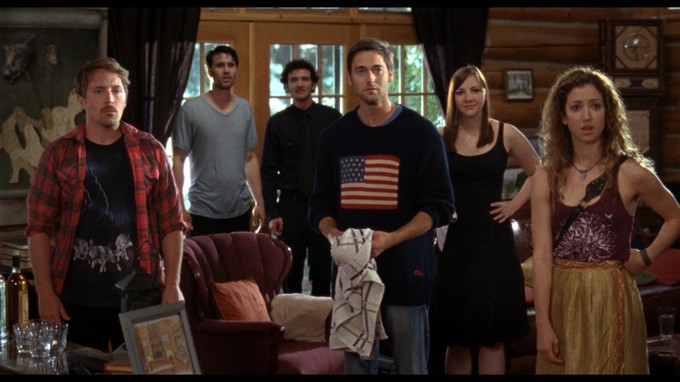
VINYARD: You wrote and directed- I know you co-wrote- so I want to talk about the inception. Was this your idea? Was this inspired by something that happened to you, or something you were going through?
CHRIS: Yes…in a word, yes. I grew up in this house in north Georgia, and it was the place where all my friends came to…we just grew up together there. It's where we drank alcohol for the first time, and went skinny dipping for the first time! It became even more of a sort of holy place as we got older, through college, and then after college, because when everyone's changing, it's nice to have this constant, this thing that you know will never change. It became the epicenter of our collective group. I was there one summer with Mo (Narang), and we were talking about loss. We were talking about story we wanted to write, and we were thinking about things that we were scared of. We just recently had conversations with our parents about going through their wills, so that was on our minds a lot. We were at this house, and we thought, "Well, what if we lost this place? What if we lost our parents, what if we lost our friends?" So we started writing this story, purely as a fiction. Then within a year, my parents sold the house and moved away, which was terrifying. Couple of our friends parents started getting sick, and this fiction that we had written suddenly became this story that was much more personal, and one that became a priority for us to tell as authentically and as realistically as possible. That's really where the film became the film.
VINYARD: So all of a sudden reality started mirroring what was going on in the script?
CHRIS: Definitely, definitely. It was very much art imitating life imitating art, which is kind of a subtle theme throughout the film when you see it. There's a constant reminder of that, whether it's the black-and-white photography that's scattered throughout. That's all my photographs, most of them of our home in Georgia. Whether it's the cutaways from the drawings of the house to those actual places in the house itself that you see throughout the film, or embracing the rollouts. The movie opens with the rollouts, that's what we're looking at, all the rollouts from the actual film itself. So there's kind of a layering of art imitating life imitating art going on, because that's what was going on when we were writing it.
VINYARD: And it was based on a real house, so when you were looking for locations- you didn't shoot in Georgia, you shot in Michigan right?
CHRIS: That's right.
VINYARD: How did you go about searching for the house?
CHRIS: FInding the house was very, very important, and very, very difficult, 'cause the house is one of the biggest characters in the movie. It couldn't just be good enough, it had to be the right place. It was hard. It was very difficult to find. Especially because you as an audience member are living in this place with these people, so it just has to feel good. It can't feel claustrophobic. It can't feel boring. It has to feel like a home you want to spend 90 minutes in. Steve Gorel, who is the producer, was doing our location scouting, and I just felt terrible for this guy. Just driving all over Michigan sending me photo after photo after photo, and every one of those I was just shooting down, shooting down, shooting down. I remember going to look at one and it was good, and at that point I was getting so hopeless that I was like, "Okay, maybe we can make this work, we'll just have to do this and that." Then I remember walking into where we ended up shooting, and it immediately was clear that this was the right place. Which was good. It was nice to have that sense of security of, "Oh yeah, this is it. This it the house, period."
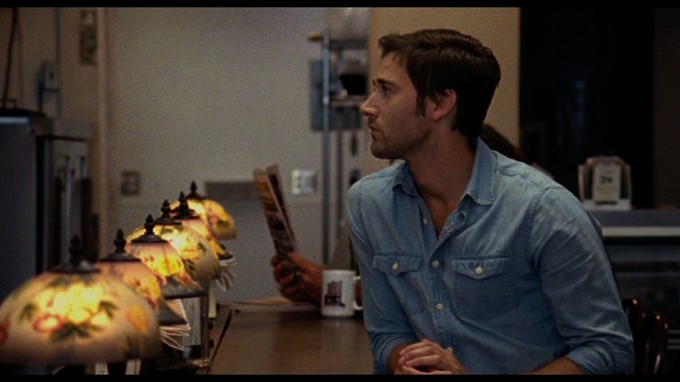
VINYARD: Obviously, your training is as an actor, and this is an extremely personal movie for you. You wrote and directed. Was there ever any desire to lead it up yourself?
CHRIS: Not really…for a split second maybe. Initially, when I'd gone to school for directing, my brilliant idea was that I'd eventually get to a place where I could make films, and then I'd just start casting myself in all the best parts. Right? Which is the goal of most actor/directors. Ironically, of course, when I finally did make my first film, the last thing that I wanted to do was act in it, mostly because…if we're in a scene together, and I'm an actor and you're an actor, the goal, the thing I want more than anything- which rarely happens, but what you're striving for is a moment where I am able to completely block out everything around us, and just give all of my attention and focus to you. To just be in the moment with you. If you're directing as well, then you cannot do that, because you have to simultaneously be thinking abotu the boom mic, and the camera movement, and the extras, and your performance. Which is just juggling too many things. Believe me, making a film is a big enough responsibility, as is acting in a film, and I just felt that if I tried to do both, I wouldn't enjoy either all the way.
I had a brief fear that I was going to show up on set, and I was going to be looking at the monitor, and seeing these actors saying my words, and have a flip out. Like I'd think to myself, "No, I could do this so much better! Why am I not in front of the fucking camera?! This is my spot! I know how to say these lines, you don't know what you're doing!!" And if anything, it was the opoposite. If anything, I just remember thinking, "Oh my god, thank god I don't have to do this." In fact, the first couple days, I kept thinking I didn't want to act anymore 'cause I was enjoying directing so much. It really is such a different muscle group that you're excersising. I loved every second of it. I've written two more screenplays since, and in neither one of them is there a part that I think I would put myself in. I really don't think so.
VINYARD: So in the near future at least, you just want to stay behind the camera.
CHRIS: Frankly, especially with BESIDE STILL WATERS, I'm all over that movie. When I watch that movie, I'm like, "There is so much me in it, if I was also onscreen, it would be disgusting." You know?
VINYARD: Yeah, I got the feeling that it was very personal. Even Ryan Eggold's performance is very specific. I thought it was very closely in line with what you were going for, and there's a lot that's unsaid and a lot in his body language. I was just curious how closely did you two develop the character? Did you try and create a distance between what he was doing and what you perceive as yourself to try and give him his own identity?
CHRIS: Exactly. One of the best pieces of advice I got- oftenstimes, people are writing stories about friends, and it's inspired by their people- one of the best pieces of advice I got from an actor friend of mine was, "Do not try and tell a story about you and these people. Let these actors tell a story about them and these people. Don't be precious about, 'Your friend Lindsay inspired this character! This person doesn't sound enough like Lindsay, Lindsay would say it like this!' Don't think that way. It's a gift that they're doing it differently. You're getting to see something much more organic." With Ryan, really all I knew I wanted with that character is somebody that was immediately sympathetic, somebody that could convey a sense of depth and loss and heartbreak. But not in a way that felt whiny, and not in a way that felt completely beaten, in a way that, as an audience member, you still want to hope for them. Ryan's audition was just brilliant in that sense. He and I met a couple of times. He actually made a short film, it's a wonderful short film, which had a very similar type of protagonist. So I knew he understood it very deeply. Then after that, I just kind of let him take it away and do with it what he did do, which is this amazing work.
With all of these actors, I think I made myself as vulnerable and available as possible to them, and in turn, they gave me that same amount of trust and vulnerability. I think that was one of the things that was most evident as crucial, this trust that must exist between a director and an actor in order to get the kind of performances we were able to get in this film. I think all the actors do spectacular work.
VINYARD: I think that's one thing about actor-turned-directors, I think they have a great eye- and this film is a great example of that- of what the actors are capable of, what you want to get from them, and also a restraint in letting them do what they do. Obviously, you have a history in television, and a bunch of your actors have a history in television, but they're all doing very great, cinematic work.
CHRIS: That's great to hear, thank you for saying that.
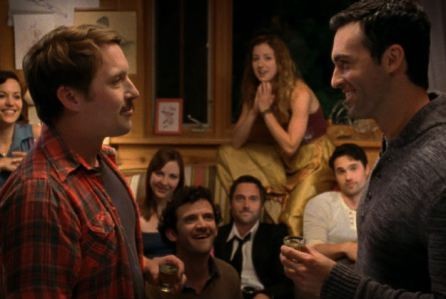
VINYARD: How did you get the cast together? 'Cause a bunch of them are from currently-running TV shows.
CHRIS: They are now, exactly.
VINYARD: When did you shoot?
CHRIS: We shot this two years ago. So this is before S.H.I.E.L.D., it was before BLACKLIST, VEEP had just started shooting. This was before SATURDAY NIGHT LIVE for Beck (Bennet). It was before any of those things for any of these guys. I remember when we were casting- I had seen every fucking reunion film ever made, the ones that worked, and all the ones that didn't work. One of the consistencies I felt with a lot of the ones that didn't work is that they'd be stacked with celebrities. The problem with that is, specifically for a reunion film, is that you have to believe that these people all have this shared history together, and the moment you see a bunch of celebrities onscreen pretending to be all friends, you're immediately taken out of it. 'Cause you're thinking, "You're not old friends, you're from this, and you're from that." There's this arm's length. You already don't buy it, and the story hasn't even begun. In those situations, all those actors are being offered the parts, so there's no sense of chemistry reads. Like do they have chemistry? Are they even going to gel well onset?
For me, I was like, "We're not makin'…we're gonna do it however we want to do it." I got Kerry Barden, Paul Schnee, and Alison Estrin, who cast me in THE HELP, and who I love, who are very good at putting together ensembles because they've done so many. THE HELP is a huge ensemble, AUGUST: OSAGE COUNTY is a huge ensemble. They're also great at discovering actors right before they're about to break. They cast BOYS DON'T CRY, they cast fuckin' WINTER'S BONE. They're incredible. I remember sitting them down, and saying, "I want the actors who are about to break, but who haven't broken yet. And I want all of them to audition, and I want all of them to commit to chemistry reads, and rehearsals, and run-of-picture."
And that's what we got. Each of these actors went to Michigan early, stayed at the house, we did rehearsals in every room, we all cooked together, they played drinking games togehter, they went skinny-dipping together. They basically lived the lives of these characters before we started shooting, so by the time Day 1 came, they already had a very real history. They had a shared history. They had stories, they had inside jokes, they had tensions, it was great, and I think all of that translates immediately when you see it. Normally, when you're shooting a film, you show up and it takes a little while to get into the rhythm with people, but this just had to be there already because we were shooting on such a tight schedule. It had to just exist.
In terms of this idea of "cinematic work" versus…I don't know broader stuff.
VINYARD: Basically short form versus long form.
CHRIS: I think one of the things that was also important for me was that…I wanted to work with actors who had theatrical backgrounds, who would not be intimidated by scenes that were heavy with dialogue, and who understood the true nature of an ensemble, which is what being onstage is. Brett (Dalton)…this was Brett's first job, on this movie. But Brett's a Yale drama kid! The guy's a freakin' baller. He can freakin' act. I just felt like these guys were ready, they were just ready for it. The one I think was the most fascinating for me to watch was Beck (Bennet), because Beck gives such a subtle, beautiful perfomance in the movie. Beck's just so known for being this big, broad sketch comedy guy. He's the only person I knew prior to shooting, he was my freshman roommate in college. I've seen his dramatic work, I know what he's capable of. I remember our first day on set, we were doing some scenes, and you could feel the other actors making bigger choices, and getting bigger laughs, and I could see Beck wanting to get a bigger joke, 'cause he can easily do it. I remember telling him, "Everything you need to do is so subtle. I don't want anyone to hear the jokes you're telling but you. You're telling them for yourself." That was the only bit, and he was like, "Alright!" We did one scene in one take, and he looked over at me like, "This is what we're doing?" And I was like, "That's it," and he went, "Okay!" Watching it now, I think Beck is kind of the sleeper hit of the film, because all of the work he does is so quiet and so brilliant to me.
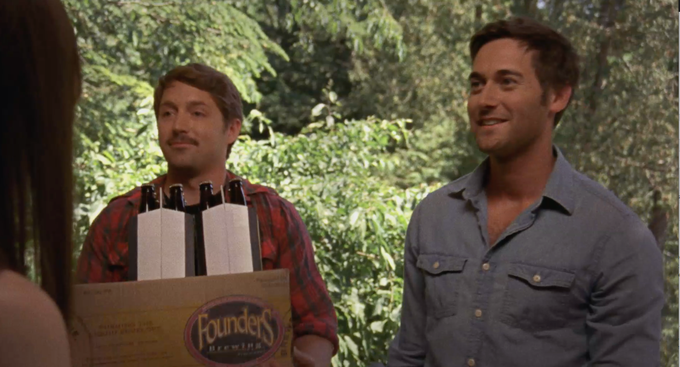
VINYARD: He lets the mustache do a lot of the work.
CHRIS: The mustache does a lot of the work for him.
VINYARD: It's interesting to hear that you have a history with him, because he kind of plays the character with the closest relationship to Ryan's character in the movie. So he's kind of playing himself…
CHRIS: Beck's was probably the only character I wrote that I was like, "Beck would be great in this part." He's good friends with Mo, we all go back. Beck's been to that house in Georgia, he's been there plenty of times. That's a really great observation actually, and I think an accurate one. Frankly, talking about art imitating life, there were definitely times on set when I'd start feeling overwhelmed and nervous, and Beck would be that for me. Beck would calm me down, and we would have little pow-wow's together. Beck probably should've gotten paid twice as much, 'cause I feel like he worked twice as hard being a best friend to Ryan in this fictional world and then being a best friend to me in the very real, panicky world that I was in.
VINYARD: It's also great because, like you said, Beck and Brett hadn't really done their work that they're best known for now at that time. Now the film's coming out, people have the image of S.H.I.E.L.D. and the baby-man (from SNL)…
CHRIS: It's so funny, I know!! Last night, I heard Brett getting asked that question left and right, "It's so interesting to see you as this character, 'cause everyone knows you as being this big, tough, brooding guy," and I'm like, "What are you talking about?! Brett??" For me, it's so the opposite, 'cause I feel like Brett's character is much more who Brett is, but it's so funny to watch AGENTS OF S.H.I.E.L.D. and watch him be this tough, unpredictable kinda bad boy, it's crazy.
VINYARD: It's great to see him doing the more comic stuff, just the insecure stuff that he doesn't get to do on AGENTS OF S.H.I.E.L.D. because he's such a tough guy. That sort of petty, insecure side of that character, I love it.
CHRIS: I just think it's so beautiful, it's wonderful that he was able to showcase that. Beck talks about this too. I think it's wonderful for Brett and Beck, 'cause you can really see their range. Watch Baby Boss, and then go watch BESIDE STILL WATERS, you know what I mean? Or watch an action sequence in AGENTS OF S.H.I.E.L.D., and then go watch Brett in BESIDE STILL WATERS. It's crazy to see.
VINYARD: Like you said, these reunion movies, when they're done right, can be a great showcase for the actors, which I think this is.
CHRIS: If nothing else, for these actors, it really showcases what they're made of. And they worked their asses off, man, and I think it shows.
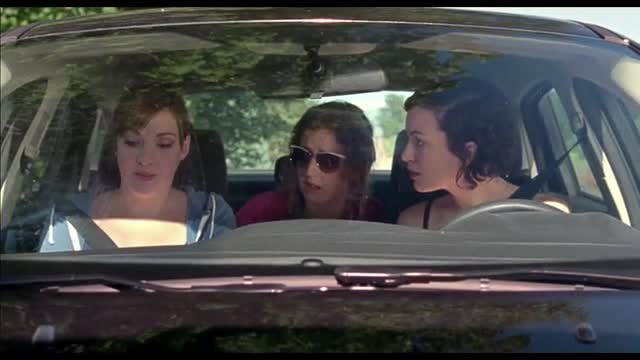
VINYARD: If you don't mind, I'm gonna squeeze one last question in: you mentioned you watched reunion films that work, and the reunion films that don't work. I'm not going to press you for the ones that don't work, I've seen plenty.
CHRIS: Thank you. Yeah, you've seen them.
VINYARD: I know every single celebrity that you're referring to. But obviously, there's THE BIG CHILL, which is the big reference point for this type of movie, but can you name a couple others you had swimming around in your head?
CHRIS: I wouldn't say we had any swimming around when we were writing. It was more when we were going into making the film, like what were some of the mistakes, what worked what didn't work. THE BIG CHILL is obviously like the crowning achievement of this genre, or subgenre I guess you could call it. I love THE RETURN OF THE SECAUCUS SEVEN. Actually, one movie that didn't expect to love as much as I did was this movie called CEREMONY with Uma Thurman and Lee Pace. it's not even a reunion film, it's…
VINYARD: It's a wedding film.
CHRIS: Right, and it's set in a house for a weekend. I remember we were watching anything that could be connected with a limited period of time, and I just loved what the director did in not being afraid to make these characters flawed, broken people. That was something we were really trying to lean into more with our characters, and I just remember seeing it being executed so well in that movie, and being like, "Oh, we can do this. It's okay to have your protagonist, and all your characters, not do the right thing. It's actually maybe better when that happens."
VINYARD: Sure.
CHRIS: In terms of reunion movies, those were the ones that we loved. Then we just love JULES ET JIM, which is this Truffaut film. I think that's the one you'll see the most direct references to in BESIDE STILL WATERS, in terms of things they did that we loved. Like that movie begins with this really intense, profound quote over black, and then this crazy BA-DA-DA-DA-DA noise and imagery, and that's kind of how our film begins. Pose the philosophy, then have this crazy opening credits sequence to mull that over. A lot of the games, the sense of games, the drawing on the chins, when she's painting the mustache on her face, there's a lot of inspiration from that.
Detroit residents can catch BESIDE STILL WATERS tomorrow at The Maple Theater with Lowell in attendance (tickets available here). For those of you not residing in the Motor City, you can catch the film on VOD, iTunes, or Amazon. For more info, visit the film's official site or Facebook page.
